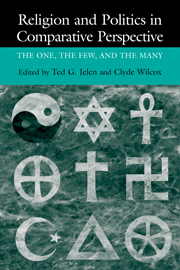Book contents
- Frontmatter
- Contents
- List of Contributors
- Preface
- 1 Religion: The One, the Few, and the Many
- 2 The Challenge of Pluralism
- 3 Catholicism, Politics, and Culture in the Republic of Ireland
- 4 Religion and Politics in Iberia
- 5 The Religious Dimension of Israeli Political Life
- 6 Between Heaven and Earth
- 7 Islamism in Contemporary Arab Politics
- 8 Religion and Politics in a Secular Europe
- 9 Religion and Democracy in South America
- 10 Looking for Hope in Central America
- 11 Religion and Politics in India
- 12 Religion and Politics in Japan
- 13 Religion and Politics in an Open Market
- 14 The Political Roles of Religion
- Index
7 - Islamism in Contemporary Arab Politics
Lessons in Authoritarianism and Democratization
Published online by Cambridge University Press: 05 June 2012
- Frontmatter
- Contents
- List of Contributors
- Preface
- 1 Religion: The One, the Few, and the Many
- 2 The Challenge of Pluralism
- 3 Catholicism, Politics, and Culture in the Republic of Ireland
- 4 Religion and Politics in Iberia
- 5 The Religious Dimension of Israeli Political Life
- 6 Between Heaven and Earth
- 7 Islamism in Contemporary Arab Politics
- 8 Religion and Politics in a Secular Europe
- 9 Religion and Democracy in South America
- 10 Looking for Hope in Central America
- 11 Religion and Politics in India
- 12 Religion and Politics in Japan
- 13 Religion and Politics in an Open Market
- 14 The Political Roles of Religion
- Index
Summary
Islam plays a pivotal role in all aspects of Muslim societies. Arab leaders have had to contend with Islam as a political and ideological force ever since Mohammad's temporal rule. The demands and requirements of Islam and Islamism have always shaped Arab political systems, processes, and policies, regardless of the type of regime in power. Islam has historically been subject to a cyclical pattern of political quietism and activism. The periods of activism have been marked by intense and often violent struggles for political dominance of Islam, whereas the quietist periods were marked by retreat and subjugation to the established orders. Given the significance of Islam in Arab societies, however, even during the periods of quietism Islam has played a determining role in Arab politics.
The current Islamist activism has brought a worldwide attention to Islam as a sociopolitical force. Samuel Huntington's concern about the “clash of civilizations” in this century focuses in part on danger to the West from the Muslim world (Baker, p. 118). Islam will remain a dominant force in Arab political life, but it is not so monolithic as many observers believe.
ISLAMISM IN ARAB POLITICS
Students of the Middle East and Islamic politics have long struggled over the proper terms to describe the movement of Islamic activists, using terms such as Islamic fundamentalism, Islamic revivalism, and Islamism. The term Islamic fundamentalism gained a great deal of popularity in the United States after the Iranian revolution.
- Type
- Chapter
- Information
- Religion and Politics in Comparative PerspectiveThe One, The Few, and The Many, pp. 139 - 166Publisher: Cambridge University PressPrint publication year: 2002
- 1
- Cited by



